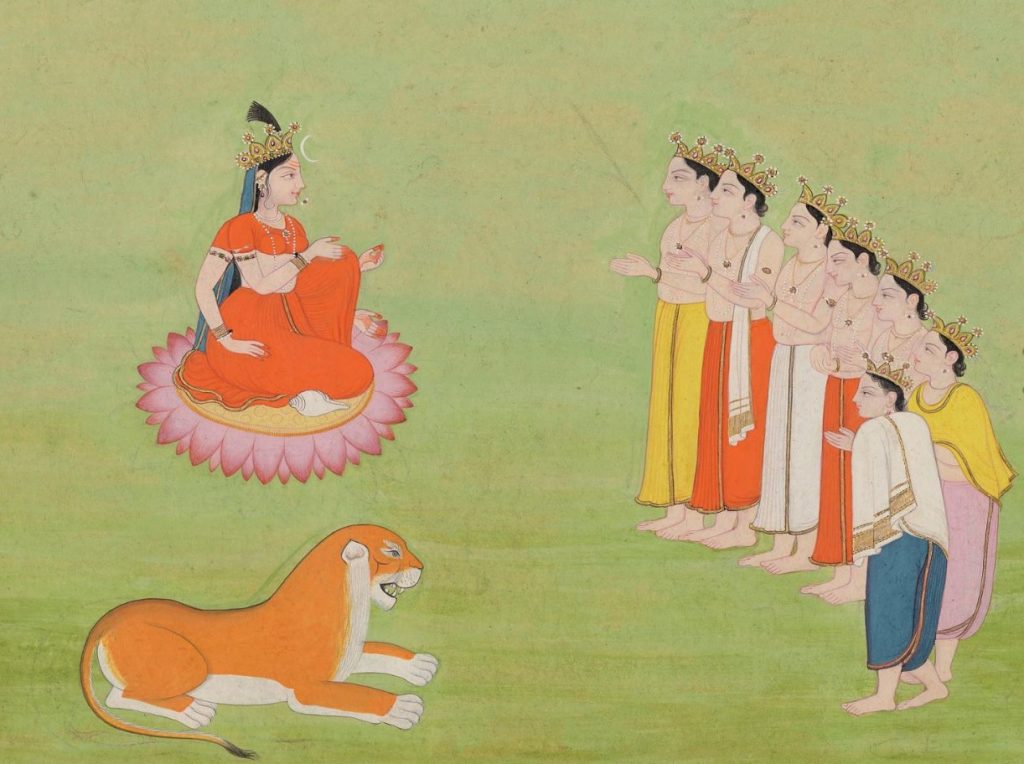Chapter 12: The Promise of Blessings

Devy Uvāca
12.1 The Devī Said:
ebhiḥ stavaiś Ca Māṁ Nityaṁ stoṣyate yaḥ samāhitah
TasyāHaṁ sakalām bādhāṁ Nāsayiṣyāmy asaṁśayam
12.2 “I Shall Without Doubt Destroy every misfortune of those who with collected mind will Praise Me always with these Hymns.
madhukaiṭabhanāśam ca mahiṣāsuraghātanam
kīrtayiṣyanti ye tadvad vadhaṁ śumbhaniśumbhayoḥ
12.3 Those who recite the destruction of madhu and kaiṭabha, the killing of mahiṣāsura, and the slaying of śumbha and niśumbha
aṣṭamyāṁ ca caturdaśyāṁ navamyāṁ caikacetasaḥ
śroṣyanti caiva ye bhaktyā Mama Māhātmyam Uttamam
12.4 with singleness of mind on the eighth, fourteenth, and ninth days of the lunar fortnight, and those who listen with devotion to This Supreme Poem of My Glory
na teṣāṁ duṣkṛtaṁ kiñcid duṣkṛtotthā na cāpadaḥ
bhaviṣyati na dāridryaṁ na caiveṣṭaviyojanam
12.5 will have no evil befall them, nor any misfortunes arising from wrongdoing. For them there will be neither poverty nor separation from loved ones,
śatruto na bhayaṁ tasya dasyuto vā na rājataḥ
na śastrānalatoyaughāt kadācit sambhaviṣyati
12.6 nor danger from enemies, robbers, or kings. Nor at any time will danger arise from weapons, fire, or flood.
tasmān Mamaitan Māhātmyaṁ paṭhitavyaṁ samāhitaiḥ
śrotavyaṁ ca sadā bhaktyā Paraṁ Svastyayanaṁ Hi Tat
12.7 Therefore this poem of My Glory is to be recited by those of concentrated mind and heard always with devotion, for it is the Supreme Way to Well-Being.
upasargān aśeṣāṁs tu mahāmārīsamudbhavān
tathā trividham utpātaṁ Māhātmyaṁ Śamayen Mama
12.8 May this Glorification of Mine put to rest all misfortunes born of pestilence, and also the three kinds of calamity.
yatraitat paṭhyate samyaṅ nityam āyatane Mama
sadā na tad vimokṣyĀmi Sānnidhyaṁ tatra Me Sthitam
12.9 Where It is always and rightly recited in My Sanctuary, that place Shall I Never Abandon. There My Presence Is Abiding.
balipradāne püjāyām agnikārye mahotsave
Sarvaṁ Mamaitac Caritam uccāryaṁ śrāvyam eva ca
12.10 In the offering of oblations, in worship, in the fire ceremony, and in the great festival, All These Deeds Of Mine Are To Be Proclaimed and Heard.
jānatājānatā vāpi balipūjāṁ tathā kṛtām
Pratīcchiṣyāmy Ahaṁ Prītyā VahnihoMaṁ tathākṛtam
12.11 When offerings are made in worship, with or without proper knowledge, I Shall Receive Them Gladly and also the fire oblation performed in like manner.
śaratkāle mahāpūjā kriyate yā ca vārṣikī
tasyāṁ Mamaitan Māhātmyaṁ śrutvā bhaktisamanvitaḥ
12.12 At the great annual worship which is performed in the autumn season, those who hear This Poem of My Glory and are filled with devotion
sarvābādhāvinirmukto dhanadhānyasutānvitaḥ
manuṣyo matprasādena bhaviṣyati na saṁśayaḥ
12.13 will be Freed by My Grace from all afflictions and Endowed with wealth, grain, and progeny. Of this there is No Doubt.
śrutvā Mamaitan Māhātmyaṁ tathā cotpattayaḥ śubhāḥ
parākraMaṁ ca yuddheṣu jāyate nirbhayaḥ pumān
12.14 Hearing of My Glory, My Auspicious Manifestations, and My Prowess in battles, they become fearless.
ripavaḥ samkṣayaṁ yānti kalyāṇaṁ copapadyate
nandate ca kularh puṁsāṁ Māhātmyaṁ Mama śṛṇvatām
12.15 For those who hear My Glorification, their adversaries go to utter destruction. Well-Being comes to them, and their families rejoice.
śāntikarmaṇi sarvatra tathā duḥsvapnadarśane
grahapīḍāsu cogrāsu Māhātmyaṁ śṛṇuyān Mama
12.16 For those troubled by nightmares or the ill-boding of stars, at rituals for Averting Evil This Poem Of My Glory should always be heard.
upasargāḥ śamaṁ yānti grahapīḍāś ca dāruṇāḥ
duḥsvapnaṁ ca nṛbhir dṛṣtaṁ susvapnam upajāyate
12.17 It Causes misfortunes and evil portents to Subside, and It Turns nightmares into sweet dreams.
bālagrahābhibhūtānāṁ bālānāṁ śāntikārakam
saṅghātabhede ca nṛṇāṁ Maitrīkaraṇam Uttamam
12.18 It Pacifies children overcome by seizures, and wherever discord divides, It Best Restores Friendship.
durvṛttānām aśeṣāṇāṁ balahānikaraṁ paraṁ
rakṣobhūtapiśācānāṁ paṭhanād eva nāśanam
12.19 It Is Unsurpassed In Diminishing the might of all evildoers. Truly Its Recitation Brings about the destruction of fiends, ghosts, and ghouls.
sarvaṁ Mamaitan Māhātmyaṁ Mama sannidhikārakam
12.20 This Entire Glorification Of Mine Draws one near to Me.
paśupuṣpārghyadhūpaiś ca gandhadīpais tathottamaiḥ
viprāṇāṁ bhojanair homaiḥ prokṣaṇīyair ahamiśam
12.21 As by the offerings of finest cattle, flowers, gifts, incense, perfumes, and lights, made day and night for a year; and as by the feeding of Brāhmaṇas, by oblations, by consecrated water;
anyaiś ca vividhair bhogaiḥ pradānair vatsareṇa yā
Prītir Me Kriyate sāsmin sakṛt sucarite śrute
12.22 and as by diverse other propitiations and offerings; so also by Hearing the Recital of My Auspicious Deeds Am I Pleased.
śrutaṁ harati pāpāni tathārogyaṁ prayacchati
rakṣāṁ karoti bhūtebhyo Janmanāṁ Kīrtanaṁ Mama
12.23 When Heard, This Poem of My Glory Removes Impurities and Grants Freedom from disease. The Relating of My Births Confers Protection from evil spirits.
Yuddheṣu Caritaṁ Yanme duṣṭadaityanibarhaṇam
Tasmiñc chrute vairikṛtaṁ bhayaṁ puṁsāṁ na jāyate
12.24 Since It Recounts My Deeds In Battle, Crushing the wicked daityas, when Heard, It Dispels all fear of enemies.
yuṣmābhiḥ stutayo yāś ca yāś ca brahmarṣibhiḥ kṛtāḥ
brahmaṇā ca kṛtās tās tu prayacchanti śubhāṁ matim
12.25 Praises Uttered by you and The Brāhmanical seers and by Brahmā himself Produce an auspicious mind.
Araṇye Prāntare vāpi Dāvāgniparivāritaḥ
dasyubhir vā vṛtaḥ śūnye gṛhīto vāpi śatrubhiḥ
12.26 When in a Forest, or on a lonely road, or surrounded by a Forest fire, when encircled by robbers in a desolate place or seized by enemies,
simhavyāghrānuyāto vā vane vā vanahastibhiḥ
rājñā kruddhena cājñapto vadhyo bandhagato ’pi vā
12.27 when stalked by lions and tigers or wild elephants in the jungle, when imprisoned or sentenced to death by a wrathful king,
āghūrṇito vā vātena sthitaḥ pote mahārṇave
patatsu cāpi śastreṣu saṁgrāme bhṛśadāruṇe
12.28 when in a wind-tossed boat on the mighty sea or assailed by hurtling weapons in the midst of battle,
sarvābādhāsu ghorāsu Vedanābhyardito ’pi vā
Smaran Mamaitac Caritam Naro Mucyeta Saṅkaṭāt
12.29 when caught in dreadful straits or tormented with agony, whoever remembers These Deeds Of Mine is freed from danger.
Mama Prabhāvāt siṁhādyā dasyavo vairiṇas tathā
dūrād eva palāyante smarataś Caritaṁ Mama
12.30 By My Power, lions and beasts, robbers and enemies flee far Away from one who remembers These Deeds Of Mine.”
ṛṣir uvāca
12.31 The seer said:
ity uktvā sā Bhagavatī Caṇḍikā Caṇdavikramā
paśyatām eva devānāṁ tatraivāntaradhīyata
12.32 “Having spoken thus, The Blessed Caṇḍikā, Fierce In Valor, Vanished from the sight of the Gods.
te ’pi devā nirātaṅkāḥ svādhikārān yathā purā
yajñabhāgabhujaḥ sarve cakrur vinihatārayaḥ
12.33 Their enemies Struck Down, The Gods were Delivered from affliction. They reclaimed their own dominions as before, and all partook of their shares in the sacrifices.
daityāś ca Devyā nihate śumbhe devaripau yudhi
jagadvidhvamsini tasmin mahogre ’tulavikrame
12.34 As for the daityas, after The Devī Had Slain in battle those two enemies of the gods— śumbha, the afflictor of the world, terribly fierce and unequaled in prowess,
niśumbhe ca mahāvīrye śeṣāḥ pātālam āyayuḥ
12.35 and niśumbha, great in valor—the rest of them returned to the netherworld.
evaṁ Bhagavatī Devī sā nityāpi punaḥ punaḥ
sambhūya kurute bhūpa jagataḥ paripālanam
12.36 Thus, O king, Does The Blessed Devī, Though Eternal, Manifest Again and Again for the Protection of the world.
Tayaitan Mohyate Viśvaṁ Saiva Viśvaṁ Prasūyate
sā yācitā ca vijñānaṁ tuṣṭā ṛddhiṁ Prayacchati
12.37 By Her this universe is Deluded. She Herself Brings Forth everything. Entreated, She Bestows Right Knowledge; Propitiated, She Bestows Prosperity.
vyāptaṁ tayaitat sakalaṁ brahmāṇḍaṁ manujeśvara
Mahākālyā Mahākāle MahāmārīSvarūpayā
12.38 O king, By Her all this universe Is Pervaded, By MahāKālī, Who Takes Form As The Great Destroyer at the end of time.
Saiva Kāle Mahāmārī Saiva Sṛṣṭir Bhavaty Ajā
Sthitiṁ Karoti Bhūtānāṁ Saiva Kāle Sanātanī
12.39 At that time, She Herself Is The Great Destroyer. Existing From all eternity, She Herself Becomes The Creation. She, The Eternal One, Sustains all beings.
bhavakāle nṛṇāṁ saiva lakṣmīr vṛddhipradā gṛhe
saivābhāve tathālakṣmīr vināśāyopajāyate
12.40 In times of well-being She Is Indeed Good Fortune, Granting prosperity in the homes of humankind. In times of privation, She Exists As Misfortune, Bringing About ruin.
stutā sampūjitā puṣpair dhūpagandhādibhis tathā
dadāti vittaṁ putrāṁś ca matim dharme gatim śubhām
12.41 And so, Praised and Worshiped with flowers, incense, perfumes, and the like, She Grants wealth, progeny, and a pure mind established in righteousness.”

